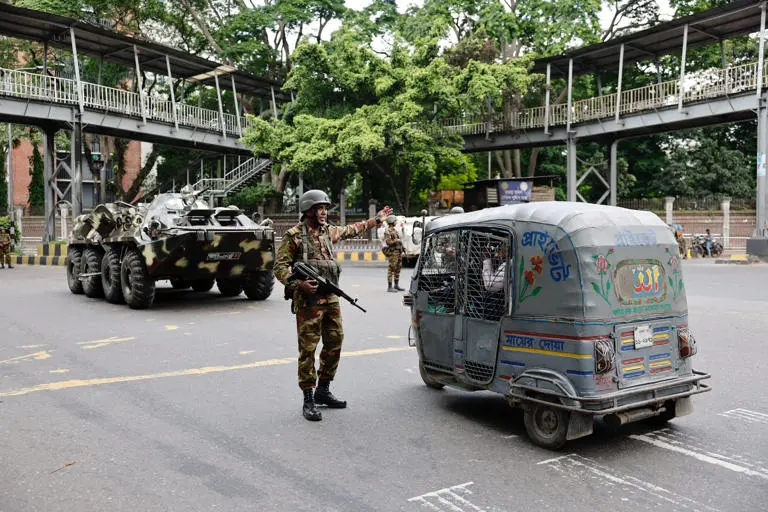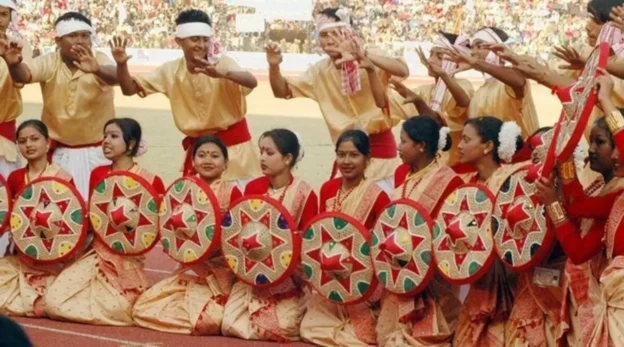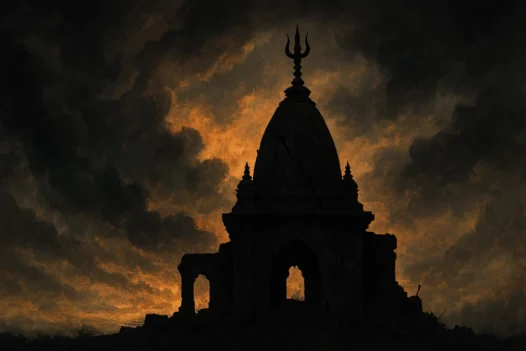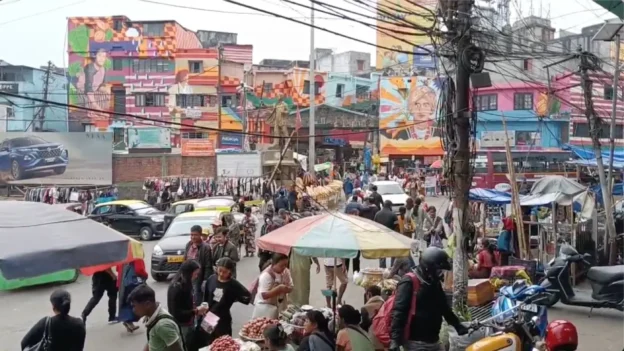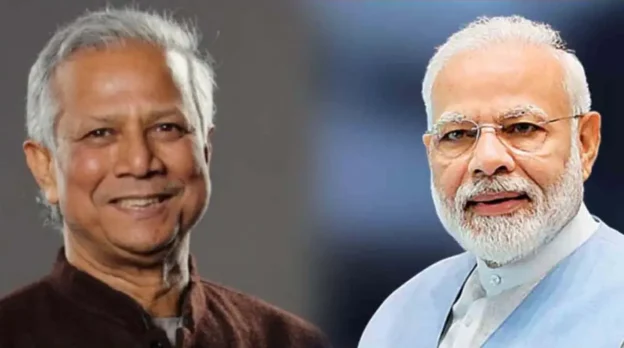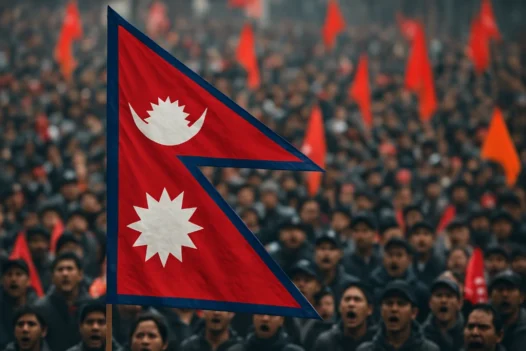Sanjoy Kumar Barua
Nearly 200 deaths were reported in just over a week of violence in Bangladesh.
Security forces are accused of excessive force but the government has blamed political opponents for the unrest, which erupted after quotas were imposed on government jobs. Most of these have now been scrapped on Supreme Court orders.
A nationwide internet blackout since Thursday has restricted the flow of information in the country, where a curfew is being enforced by thousands of soldiers.
Limited connectivity was restored on Tuesday night, with priority given to companies such as banks, technology firms and media outlets.
The violence is the most serious challenge in years to Sheikh Hasina, 76, who secured her fourth straight term as prime minister in January, in a controversial election boycotted by the country’s main opposition parties.
Police in Bangladesh arrested around 2,500 people during its crackdown on anti-quota protesters following days of violence across the country.
The country saw its worst unrest in a decade after hundreds of thousands of students took to the streets for protests that spilled into deadly violence after a counter-protest by a students’ group backed by the ruling Awami League party attacked the protesters.
Local reports suggested the death toll could be much higher but a communication blackout has prevented information from trickling out of the embattled nation.
The situation was mostly calm in capital Dhaka on Wednesday and most major cities for a second day after the Supreme Court ordered the controversial quota system for government jobs to be scaled back.
However, the security situation was still not entirely under control, the army chief, who toured the capital by helicopter on Tuesday morning, told reporters.
The protesters have given an ultimatum of 48 hours to the government for their demands to be met. The students’ group have put up eight demands, including a public apology to them from Hasina and the re-opening of university campuses shut when the violence began.
A UAE court sentenced 57 Bangladeshi nationals to prison for staging demonstrations in the Gulf country in solidarity with student protesters back home. Three of them were sentenced to life in prison, 53 to 10 years each, and one to 11 years for “gathering and inciting riots”, according to the state news agency.

Hasina doubled down on her claims that her political opponents were behind the protests that were the sternest challenge to her 15 years in power. As international condemnation poured in, she said she was “forced” to impose curfew for public safety. “I never wanted it,” she said on Monday in a meeting in Dhaka. “We will lift the curfew whenever the situation gets better.”
Why are students protesting?
Students had taken to the streets demanding an end to a quota system that reserves up to 30 per cent of government jobs for relatives of veterans who fought in Bangladesh’s war of independence in 1971 against Pakistan.
The protests began late last month but tensions escalated last week when students at Dhaka University, the country’s largest, clashed with police and a counter-protest inflamed the situation.
The students alleged the protests were peaceful until the student wing of the ruling Awami League party attacked the protesters.
The fresh clashes follow the bloodiest day of the protests to date, which led to the death of 22 people on 18 July, mostly undergraduate students, as protesters attempted to impose a “complete shutdown” in the country.
At least two journalists were among those killed during the violence.
What is the Supreme Court order?
On Sunday, the Supreme Court ordered that 93 per cent of government jobs would be allocated on merit and five per cent would be for veterans who served in the war. The remaining two per cent will be for members of ethnic minorities and transgender and disabled people.
The decision was a partial win for the students after representatives from both sides met late on Friday to discuss a resolution. Law minister Anisul Huq had said the government was open to discussing their demands.
Hasina’s government had halted the job quotas following mass student protests in 2018, but last month a high court ruling nullified that decision and reinstated the quotas after relatives of the 1971 veterans filed petitions.
However, the court order was unlikely to quell the opposition-backed protest, which was fuelled by the rise in inequality and unemployment at a time when Bangladesh’s economy continues to suffer.
At least four protest coordinators told media that they planned to continue their action until they secured the release of some detained student leaders and the restoration of internet and other cellular services.
“The judgment of the Supreme Court seems unclear to us. There is no clear-cut solution for all types of quotas,” said Abdul Quader, one of the coordinators.
What has happened so far?
Thousands of people have been injured and hospitals were filled up to capacity as protests demanding the removal of a quota system turned violent last week. Protesting students clashed with the security forces, who lobbed tear gas and rubber bullets at them.
Foreign nations, including India – one of Bangladesh’s strongest allies – issued travel advisories for its residents as Dhaka looked like a war zone over the weekend. Germany warned its citizens against travelling to Bangladesh as “further restrictions and deterioration of the situation are to be expected”.
New Delhi said over 4,500 Indian students have returned home over the past few days. It also said 500 Nepalese students and 38 from Bhutan had arrived in the country.
On Tuesday, Malaysia became the latest nation to evacuate citizens from the South Asian country, with the foreign ministry saying a flight bringing them home was set to arrive in Kuala Lumpur, the capital.
The government declared Monday a public holiday to encourage people to stay home, with only emergency services allowed to operate.
A “shoot-on-sight” order was also in place along with the curfew, giving security forces the authority to fire on mobs in extreme cases, said lawmaker Obaidul Quader, the general secretary of the ruling Awami League party.
“The government has decided to impose a curfew and deploy the military in aid of the civilian authorities,” a government spokesperson said late on Friday.
Major government websites, including of the central bank and the prime minister’s office, appeared to have been targeted by hackers. A group which called itself “THE R3SISTANC3” was reported to be behind the hacking. “Operation HuntDown – Stop Killing Students,” it said in identical messages on both sites seen on Friday, adding in bright red font, “It’s not a protest any more. It’s a war now.”
Most television news channels in Bangladesh were off the air last week after thousands of protesters stormed the headquarters of the state broadcaster BTV, vandalised furniture, smashed windows, and set fire to parts of the building.
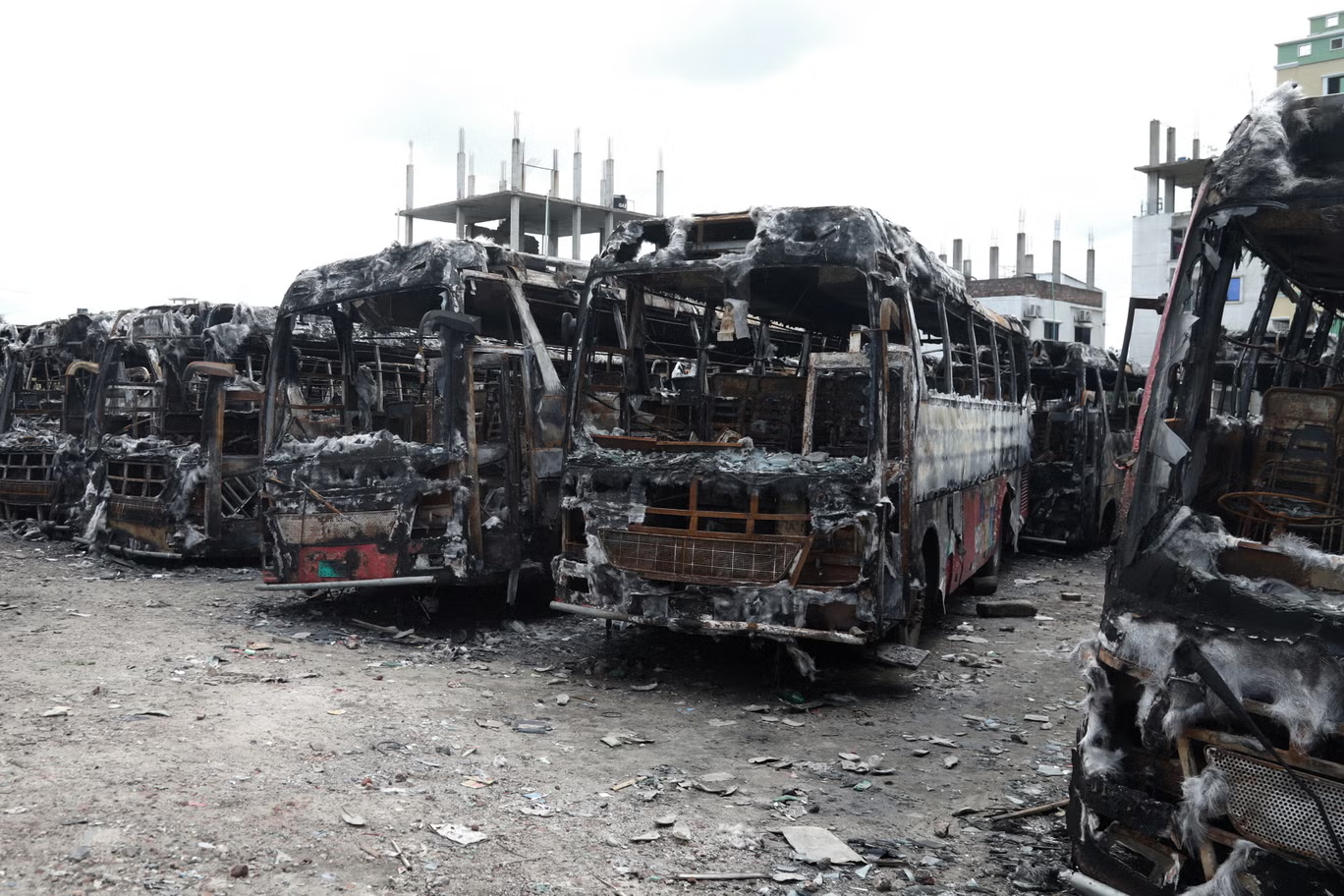
What is the quota system in Bangladesh?
In 1972, the country’s founding father, Sheikh Mujibur Rehman, introduced a quota system, reserving a percentage of government jobs for children and grandchildren of people who fought in the 1971 war of independence from Pakistan.
Under the system, 44 percent of first- and second-class government jobs are “merit” based.
The remaining 56 percent are reserved for specific communities:
30 percent for the children and grandchildren of freedom fighters
10 percent for women
10 percent “zila quota” for “backward” districts
5 percent for ethnic minorities
1 percent for people with physical disabilities
However, students have mainly protested against jobs reserved for veterans’ families, which they claim benefits mostly supporters of Hasina, whose Awami League party-led the independence movement.
The protesters have called on the government to abolish the quota for being “discriminatory” against the students, struggling amid high unemployment in a country where some 32 million young people are not in work or education. Even though job opportunities have grown in some parts of the private sector, many people prefer government jobs because they are seen as more stable and lucrative.
“We have to look out for ourselves and our future generations. We need jobs in this country, we are already suffering from the lack of it,” said a student from Dhaka.
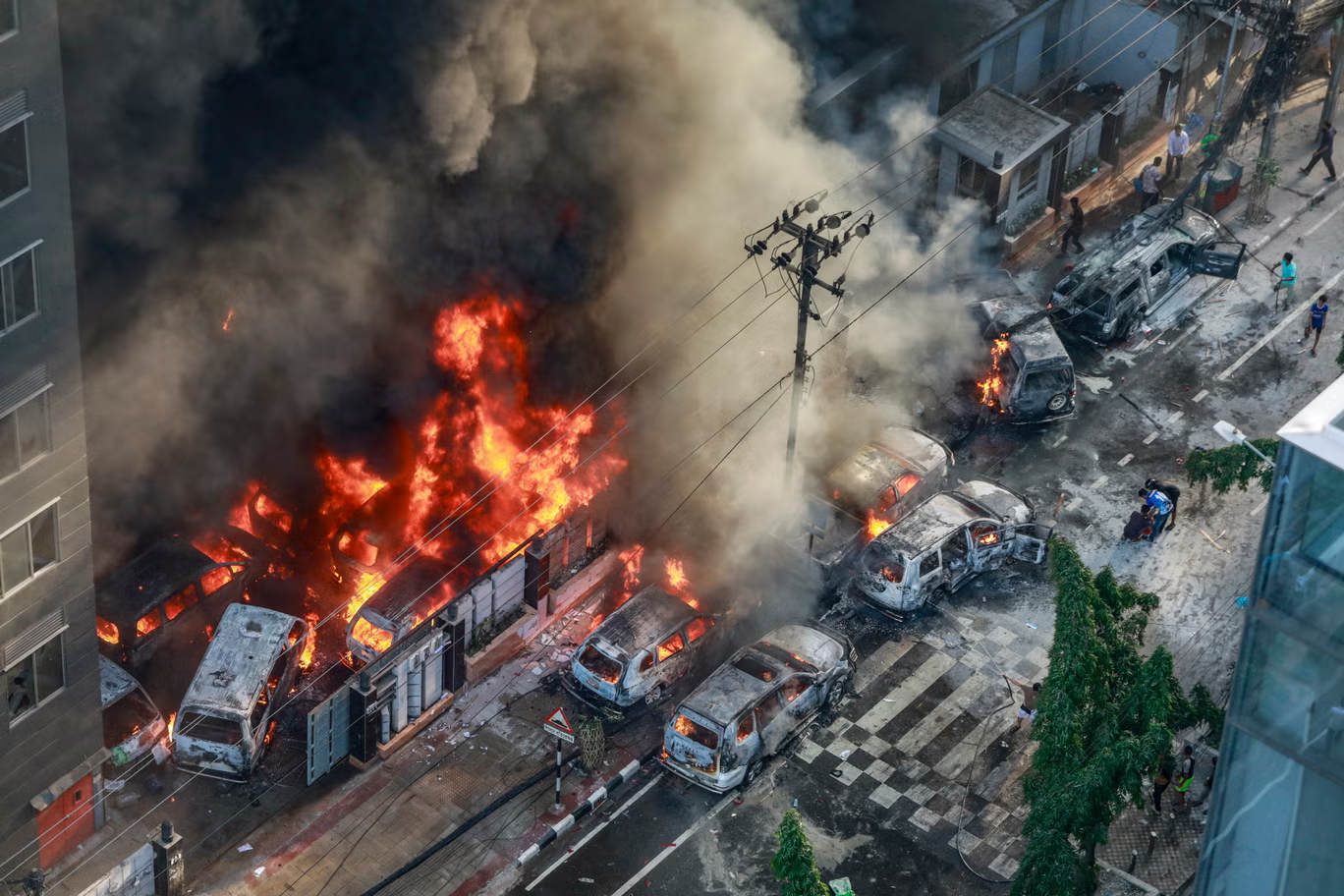
Ms Hasina is the daughter of Sheikh Mujibur Rahman, the man who led Bangladesh to independence. She has defended the quota system, saying that veterans deserve the highest respect for their contributions in the war regardless of their political affiliation.
She previously labelled those opposing the quota system as “razakar”, or volunteers, a term used for those who allegedly collaborated with the Pakistani army during the 1971 war.
Ms Hasina “was forced” to call in the army to “maintain order” as paramilitary and police failed to curtail the violence, according to reports. Rights groups have accused the police of using brute force against the protesters after bullet injuries were found on the body of a 25-year-old university student this week.
Backed by the opposition Bangladesh Nationalist Party (BNP), the students have so far refused to back down.
Earlier in the week the government suspended university classes indefinitely and asked students to vacate the dorms immediately.
The US and the UN have raised concerns about the ongoing protests and called for “restraint from all sides”.
Estimates suggest that around 18 million young Bangladeshis are looking for jobs. University graduates face higher rates of unemployment than their less-educated peers.
Bangladesh has become a powerhouse of ready-to-wear clothing exports. The country exports around $40 billion worth of clothes to the global market.
The sector employs more than four million people, many of them women. But factory jobs are not sufficient for the aspiring younger generation.
Social media in Bangladesh in recent months has been dominated by discussions about corruption allegations against some of Ms Hasina’s former top officials – including a former army chief, ex-police chief, senior tax officers and state recruitment officials.
Ms Hasina last week said she was taking action against corruption, and that it was a long-standing problem.
During the same press conference in Dhaka, she said she had taken action against a household assistant – or peon – after he allegedly amassed $34 million.
For three consecutive elections, there has been no credible free and fair polling process.
The main opposition Bangladesh Nationalist Party (BNP) boycotted elections in 2014 and 2024 saying free and fair elections were not possible under Ms Hasina and that they wanted the polls to be held under a neutral caretaker administration.
Ms Hasina has always rejected this demand.
Rights groups also say more than 80 people, many of them government critics, have disappeared in the past 15 years, and that their families have no information on them.
Source: The Chittagong Hill Tracts

